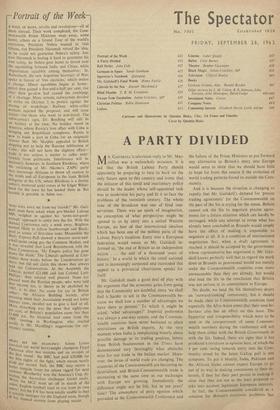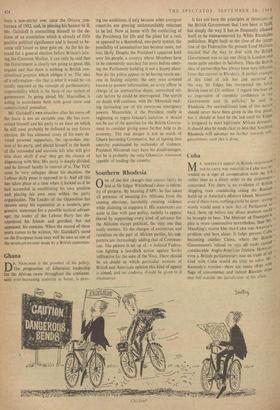A PARTY DIVIDED
MR. GAITsKELL'S television reply to Mr. Mac- millan was a melancholy occasion. It is sad that the British Labour Party should apparently be preparing to turn its back on the only future open to this country and ironic that the initiator of this timid and reactionary policy should be the leader whose self-appointed task was to modernise his-party and fit it to face the problems of the twentieth century. The whole tone of the broadcast was one of tired con- servatism. There was no spark of imagination, no conception of what perspectiyes might be opened to us by entry into a united Western Europe, no hint of that international idealism which has been one of the noblest parts of the Labour Party's tradition. Entry into a European federation would mean, so Mr. Gaitskell in- formed us, `the end of Britain as an independent nation . . the end of a thousand years of history.' In a world in which the small national unit is increasingly surpassed and outmoded this appeal to a provincial chauvinism speaks for itself.
Mr. Gaitskell made a good deal of play with the argument that the economic gains from going into the Community are doubtful, since 'we shall find it harder to sell in the Commonwealth be- cause we shall lose a number of advantages we have there at present.' To which it might be asked, 'what advantages?' Imperial preference was always a one-way system, and the Common- wealth countries have never hesitated to place restrictions on British exports. At the very moment when India is complaining bitterly about possible damage to its trading position, letters from British businessmen in the Times have demonstrated very thoroughly what obstacles exist for our trade in the Indian market. More- over, the terms of world trade are changing. The countries of the Commonwealth are becoming in- dustrialised, and British-Commonwealth trade is decreasing at the same time as our exchanges with Europe are growing. Immediately the difference might not be felt, but in ten years' time? The atmosphere of petty egotism which prevailed at the Commonwealth Conference and the failure of the Prime Ministers to put forward any alternative to Britain's entry into Europe would seem to show that we should have little to hope for from this source if the evolution of world trading patterns found us outside the Com- munity.
And it is because the situation is changing so rapidly that Mr. Gaitskell's demand for 'precise trading agreements' for the Commonwealth on the part of the Six is crying for the moon. Britain cannot ask the Six to negotiate precise agree- ments for a future situation which can hardly be envisaged, while any attempt to revise what has already been concluded in Brussels would simply have the effect of making it impossible to negotiate at all. It is a condition of international negotiation that, when a draft agreement is reached, it should be accepted by the government whose representative has negotiated it. Mr. Gait- skell knows perfectly well that to regard the work done in Brussels as provisional would not merely make the Commonwealth countries even more unreasonable than they are already, but would also lead the Six to the conclusion that Britain was not serious in its commitment to Europe.
No doubt, we (and the Six themselves) desire an 'outward-looking' community, but it should be made clear to Commonwealth countries (and especially the Afro-Asian ones) that their own be- haviour also has an effect on this issue. The hypocrisy and irresponsibility which were to be seen in the comportment of some Common- wealth members during the conference will not help them either with the British Government or with the Six. Indeed, there are signs that it has produced a revulsion in opinion here, of which the 4 per cent. swing towards entry into the Com- munity noted by the latest Gallup poll is one symptom. To put it bluntly, India, Pakistan and the African States cannot expect Europe to go out of its way in making concessions to their in- terests, if they for their part persist in making it clear that they are not in the least prepared to take into account legitimate European interests. In fact, the Commonwealth considered as a solution for Britain's economic problems has been a non-starter ever since the Ottawa con- ference of 1932, and, in pinning his banner to if, Mr. Gaitskell is committing himself to the de- fence of an association which is already of little positive political significance and is bound to be- come still looser as time goes on. As for his de- mand for a general election before Britain's join- ing the Common Market, it can only be said that the Government is clearly not going to grant this request and that there is nothing in British con- stitutional practice which obliges it to. The idea of a referendum—for that is what it would be—is totally opposed to the concept of parliamentary responsibility which is the basis of our system of government. In going ahead Mr. Macmillan is acting in accordance both with good sense and constitutional precedent.
Mr. Gaitskell's own situation after his move oil the fence is not an enviable one. He has com- mitted himself and his party to an issue on which he will most probably be defeated at any future election. He has alienated many of his most de- voted personal supporters, the up-to-date sec- tion of his party, and placed himself in the hands of the outmoded and atavistic left who will give him short shrift if ever they get the chance of dispensing with him. His party is deeply divided. and he himself hardly in control of it. The TUC must be very unhappy about his decision; the Labour daily press is opposed to it. And all this has taken place at a time when it looked as if he had succeeded in establishing his own position and placing his own men within the party organisation. The Leader of the Opposition has thrown away his reputation as a modern, pro- gressive statesman for a possible tactical advant- age; the leader of the Labour Party has dis- appointed his friends and gratified, but not appeased, his enemies. When the record of these years comes to be written, Mr. Gaitskell's stand on the European issue may well be seen as one of the worst errors ever made by a British statesman.



































 Previous page
Previous page